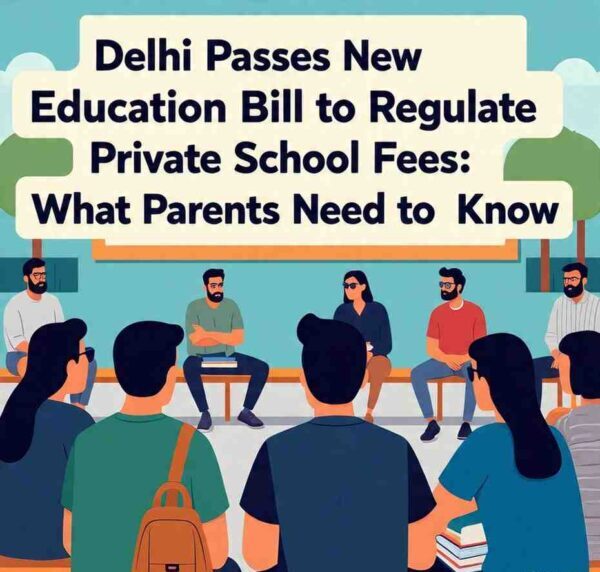The legislation enforces strict rules for fee structures in Delhi’s private schools. Understand how the new bill ensures clear fee practices, involves parents, and sets up a fast-track dispute resolution process within 45 days.
Introduction
Private schools in Delhi have often been criticized for steep annual fee hikes, hidden charges, and limited avenues for parents to challenge unfair practices. To tackle these issues, the Delhi government brought forward the Delhi School Education (Transparency in Fixation and Regulation of Fees) Bill, 2025.
This landmark legislation is designed to bring accountability, fairness, and parental participation into the process of setting school fees. It also introduces a structured grievance redressal system, ensuring that fee-related disputes are resolved quickly.
For parents, schools, and policymakers, this new law is a game-changer. Let’s break down what the bill entails, why it was needed, and how it will impact stakeholders.
Why This Law Was Needed
Over the years, parents in Delhi have raised concerns about:
- Unjustified Fee Hikes: Many schools increased fees annually without offering clear reasons.
- Opaque Practices: Parents often did not know how the fee structure was decided.
- Limited Oversight: Existing rules lacked strong enforcement mechanisms.
- Financial Pressure: Families, especially middle-class households, struggled with unpredictable increases in tuition and “extra charges.”
The government argued that education, being a public good, must balance school autonomy with transparency and fairness for parents. The new law attempts to address this balance.
Key Features of the 2025 Bill
Transparency in Fee Fixation
Private schools must now clearly disclose how their fees are determined. This includes:
- Breakdowns of tuition, infrastructure, and activity charges.
- Prior public notification of any proposed fee changes.
- Mandatory disclosure on school websites and notice boards.
This transparency will allow parents to understand where their money is going and challenge unreasonable hikes.
Parental Participation
The legislation empowers parents by providing them with an official role in fee-related matters for the first time:
- Schools are required to involve Parent-Teacher Associations (PTAs) in discussions before revising fees.
- Feedback from parents must be considered before final approval.
- This ensures that fee structures reflect not just administrative needs but also the concerns of families.
Appellate Mechanism for Disputes
One of the most important provisions is the creation of an appellate system:
- Parents opposing fee increases can submit a complaint.
- All disputes must be settled by the appointed authority within 45 days.
- Schools must comply with the authority’s decision, ensuring accountability.
This offers parents a quick and affordable alternative to lengthy legal battles.
Checks on Excessive Fees
The legislation imposes limits on schools to curb excessive profiteering:
- Schools cannot charge arbitrary “development fees” without justification.
- Fee increases must be reasonable and linked to legitimate expenses such as staff salaries or infrastructure upgrades.
- Surpluses must be reinvested in the institution, not diverted for private gain.
Impact on Parents
Parents benefit from the bill through greater authority and security over fee-related matters:
- Clarity: Families will know in advance how much they are expected to pay and why.
- Voice: Parents can actively participate in shaping fee policies.
- Relief: Quick dispute resolution means families won’t feel helpless against sudden hikes.
In the long run, this law could reduce financial stress for thousands of households in Delhi.
Impact on Schools
While the bill protects parents, it also challenges private schools to adapt:
- Administrative Burden: Schools must now maintain transparent records and justify every revision.
- Reduced Flexibility: Institutions can no longer raise fees freely to cover short-term costs.
- Improved Trust: On the positive side, greater transparency may build stronger trust with parents, creating a healthier learning environment.
Some school administrators have expressed concerns that too much government oversight may stifle financial autonomy. However, policymakers argue that accountability is necessary when education directly impacts millions of families.
Broader Implications
Delhi’s new fee regulation law could pave the way for comparable policies in other states. With private schooling forming a significant part of India’s education ecosystem, such reforms could:
- Encourage uniform standards nationwide.
- Promote greater affordability in urban education.
- Push schools to balance quality education with financial responsibility.
It also reflects a broader global trend where governments are introducing stronger consumer rights in education, ensuring institutions remain accountable to families.
Challenges in Implementation
Despite its promise, the true effectiveness of the bill hinges on proper execution:
- Monitoring: Authorities must have the resources to oversee thousands of schools.
- Compliance: Schools may attempt to find loopholes unless rules are strictly enforced.
- Balance: Regulations must protect parents without discouraging investment in better facilities and teaching quality.
If these challenges are managed well, the law could significantly reshape private education governance in Delhi.
Conclusion
With the 2025 bill, Delhi takes a significant step to ensure private education is transparent, accountable, and responsive to parents’ concerns. By ensuring clarity in fee structures, involving parents in decisions, and setting up a quick grievance redressal system, the law strengthens trust between schools and families.
For parents, this law promises fairness and relief from arbitrary hikes. For schools, it is a call to operate with transparency and accountability. And for India’s education sector, it could set the tone for similar reforms across the country.
As implementation unfolds, the coming months will reveal whether this legislation truly delivers on its promise of affordable and transparent private schooling in Delhi.

























